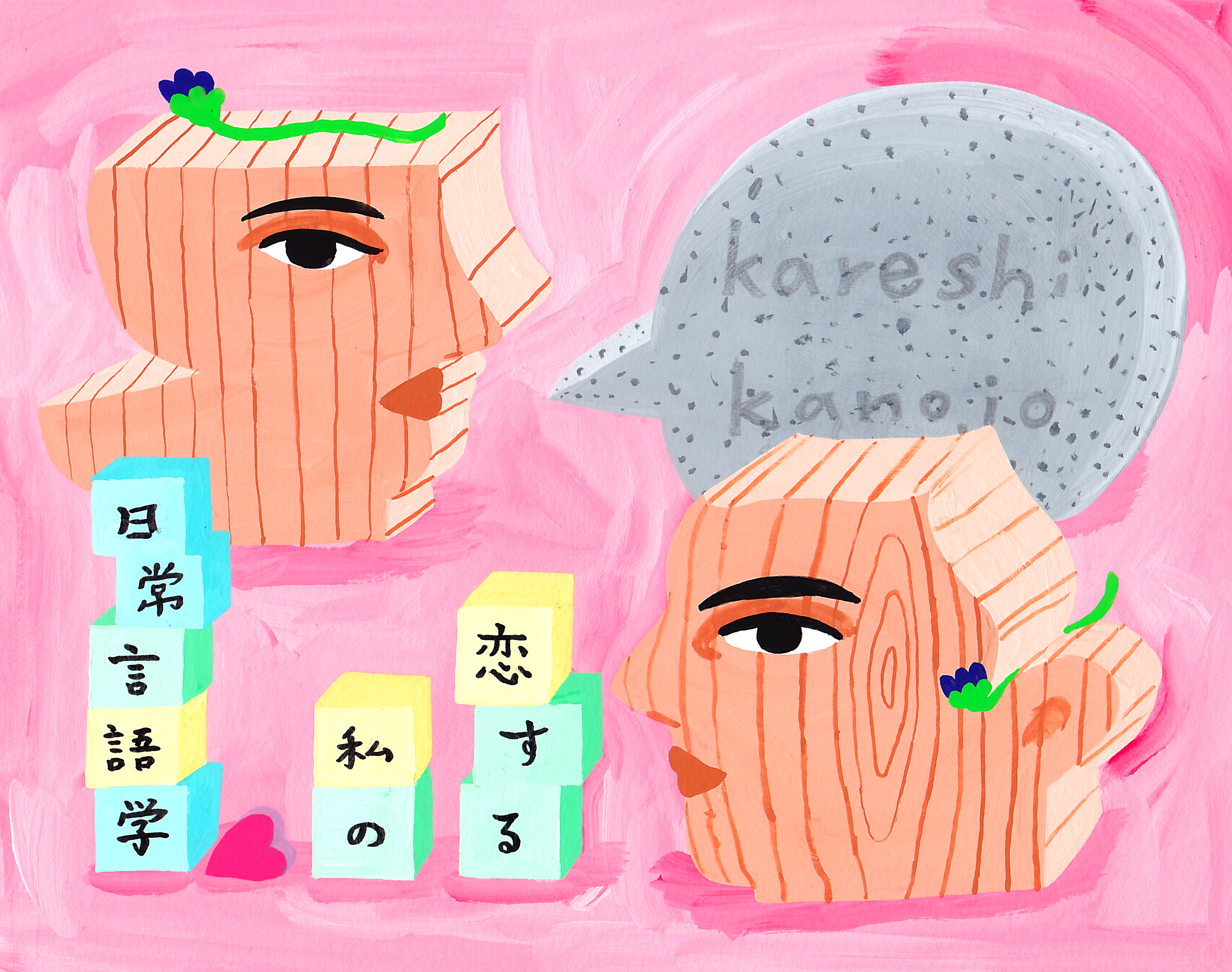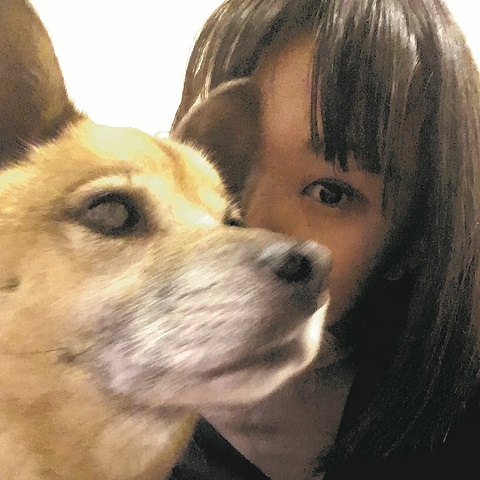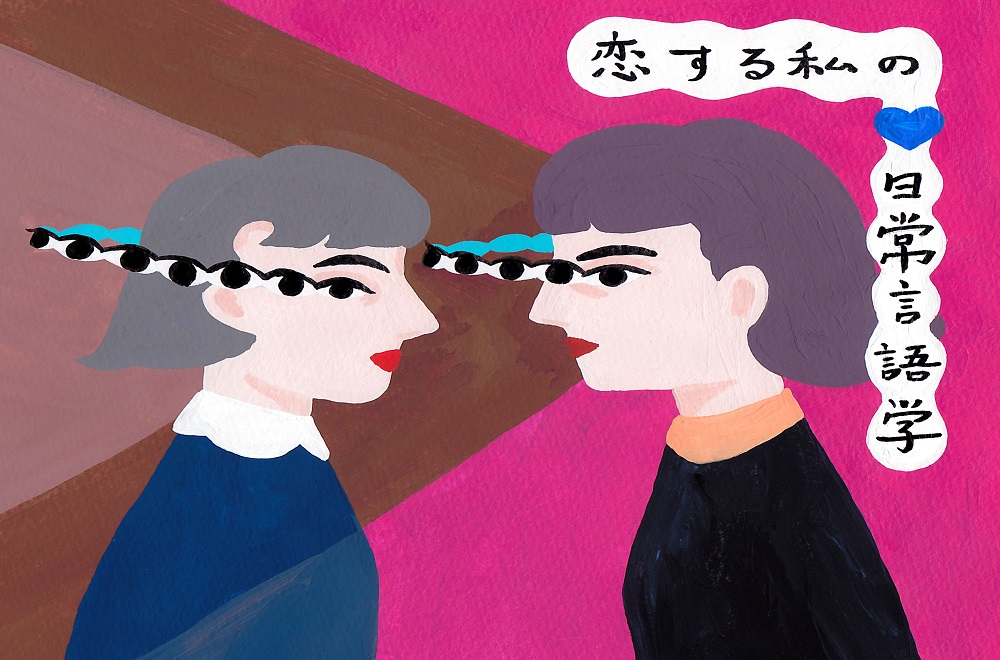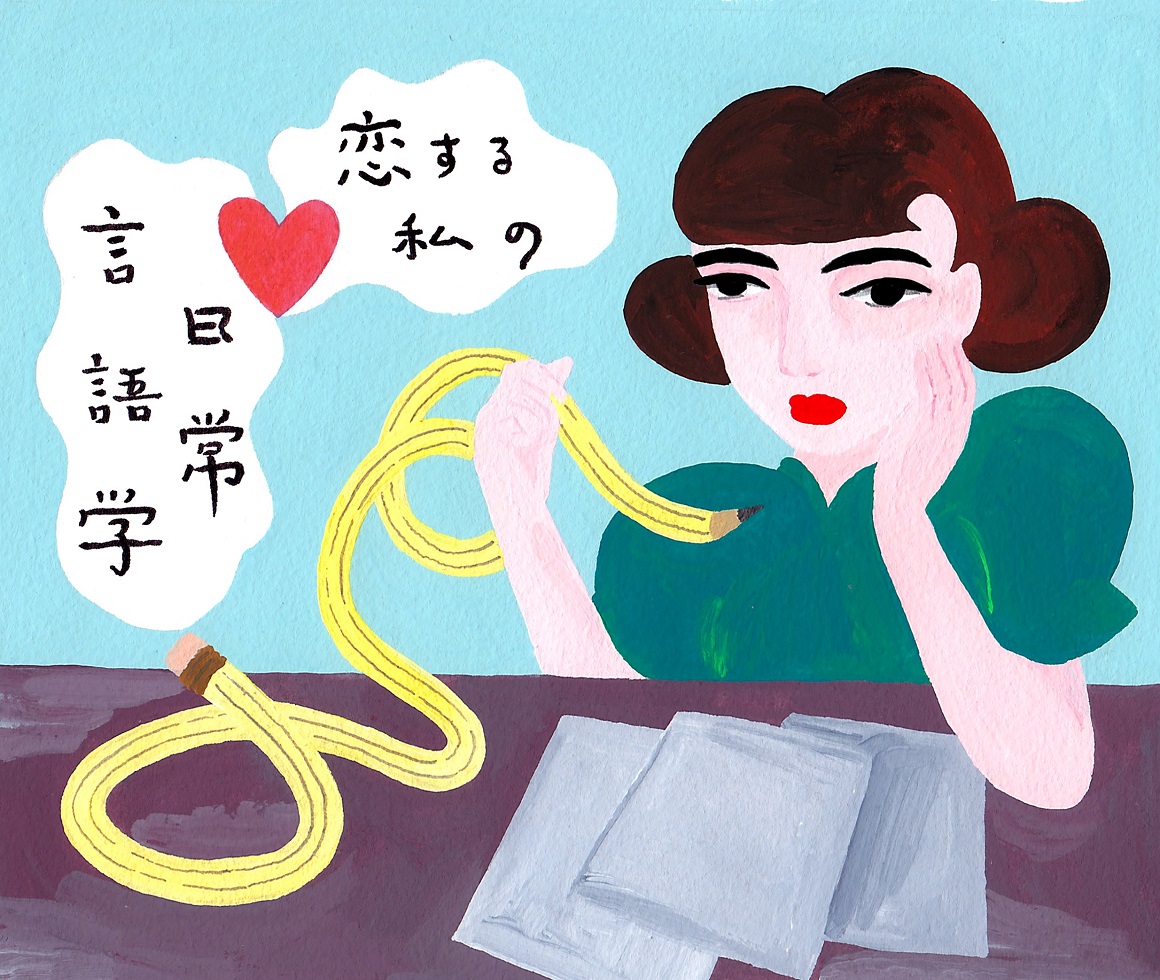Ordinary Language School for Lovers is a column on the theme of love and language. The Ordinary Language philosophy school was created by a group of scholars at Oxford University. According to the Encyclopedia Nipponica, “they followed a methodology that considered the analysis of ordinary language to be the central goal of philosophy.” In this ongoing column inspired by that school of thought, Takayuki Kiyota and Tomoko Ogawa discuss a wide range of issues related to the topic of love and romance.
Kiyota has listened to countless stories about love and romance as the founding member of Momoyama Shoji, an organization that lends an ear to people who want to talk with someone about their love life. Kiyota and other members of Momoyama Shoji then draw on those stories to write columns, create radio shows, and produce other media that explore issues like romance and gender. Ogawa is a film critic who co-wrote Everyone’s Top 100 Romance Films, and she is also writer who specializes in listening to the stories that people tell.
Do you have trouble communicating with that special someone? Or do you and with your romantic partner talk past each other? It’s possible that your choice of words might be the root of the problem.
Vol. 2
What to call a romantic partner in Japanese Whether or not to use honorifics and discomfort with the terms for “boyfriend” and “girlfriend”

Discomfort with conspicuously possessive partners
Takayuki Kiyota (TK): The topic for this installment is how to refer to a romantic partner. What do you call them when you introduce them to someone? This issue is deeply intertwined with language, and we plan to discuss what makes it such a fascinating question that is full of hidden complexity.
Tomoko Ogawa (TO): How you refer to a romantic partner reflects the nature of your relationship and your sense of distance from them. So, I think that everyone chooses their words carefully and makes certain distinctions when referring to their romantic partners, whether they’re conscious of it or not. For example, when you’re speaking Japanese, at first you might refer to someone by their family name, followed by the honorific suffix “-san.” But, when you become romantic partners, you might refer to them by their given name alone, or you might call them by a pet name. I think a lot of people have had that kind of experience. Many steps in that process can be embarrassing, and there are so many situations that can lead someone to feel uncomfortable or unsure of themselves. But, before getting into that, I know that you personally feel uncomfortable with the Japanese terms for “boyfriend (kareshi)” and “girlfriend (kanojo),” right?
TK: I do. I think I barely ever introduce a romantic partner to a third party by saying, “This is my girlfriend (kanojo).” And I feel extremely awkward when someone calls me their “boyfriend” (kareshi). A long time ago, I was dating this girl, and this friend of hers would always refer to me as “The Boyfriend” (kareshi-san). Every time it happened, there was a voice in my head that desperately wanted to scream out, “I’m begging you, quit calling me that! It creeps me out!” (Laughs.)
TO: You do always refer to your romantic partners by their name. And you describe them as “the person I’m dating.” I always thought that was a really nice way to handle it, but why are you so uncomfortable with the Japanese terms for “boyfriend” (kareshi) and “girlfriend” (kanojo) in the first place?
TK: I feel like the unspoken nuance of those terms is that they designate someone to be “(my) girlfriend” (kanojo) or “(my) boyfriend” (kareshi). I’ve never felt comfortable with the way they draw attention to a sense of possession, or with the way they suggest that your romantic partner is giving you special treatment that makes you superior to other people. To mention another example, I feel a similar kind of revulsion to the Japanese term for “best friend” (shinyuu). So, this isn’t only an issue for me in a romantic context.
TO: Interesting. So, you’re just generally uncomfortable with terms that feel possessive.
TK: Taking this even further, I would absolutely never call my wife or my lover “omae,” which is an informal pronoun for “you” that can have a condescending nuance. And I can’t bring myself to refer to them by their given name alone, without any honorific suffix at all. To be perfectly frank, I’m not comfortable with some of the common Japanese words for “wife” (yome), “husband” (shujin), or “partner” (aikata). Japanese also uses a relatively neutral loanword from English as another way to say “partner” (paatonaa), and I’m not even comfortable with that! We’ll get into the specifics of the problems with some of these Japanese language terms later in our discussion.
TO: My feelings on this issue aren’t quite as extreme as yours, but I do think the Japanese word for “boyfriend” (kareshi) is a little embarrassing. Going back to the issue of what to call someone, romantic partners tend to attach honorific suffixes to your name at first, but then at some point it just kind of drops away, doesn’t it?
TK: A long time ago, I was dating someone who would normally call me “Kiyota-kun,” using my family name and attaching an honorific suffix. Then, out of nowhere, in a letter she just called me “Takayuki,” using my given name and with no suffix at all. I have this extremely vivid memory of wanting to run away so badly that it gave me goose bumps. What is it that makes me feel so uncomfortable about this?

A visceral sense of the gap between your actual relationship and what someone calls you
TO: Well, although it apparently made you want to run away, personally I’m fascinated by how people determine what to call their romantic partners. I’m also interested in the moment when it shifts from one term to another. So, for example, there’s a Studio Ghibli movie that I know we both love, called Whisper of the Heart. The protagonist of the movie is a girl named Shizuku Tsukishima, and there’s this boy named Seiji who starts to call her by her given name only, with no honorific suffix at all, way too soon. Before Seiji even says that he likes her, he calls her just “Shizuku.” When Seiji shifts from asking where “Tsukishima” is in her classroom to calling her “Shizuku” when they talk on the rooftop, I think most people squeal with delight because it’s so romantic. But, personally, it just feels a bit off.
TK: Strangely enough, that scene definitely did make me squeal with delight, even though I’m not comfortable with the culture of just calling people by their given name. (Laughs.)
TO: I think that scene feels like they kind of skipped a step. I understand that’s part of why it sends people’s hearts aflutter. But, also, if it goes poorly, it can create a situation where it feels like someone is trying to force their way into a closer relationship than they really have.
TK: I see what you mean. First you have a feeling about the relationship. You think something like, “Well, we’re in this kind of a relationship, and we’re this close to each other,” although it’s not typically verbalized that clearly. And there’s no problem as long as what you call each other matches up with your perceptions of the relationship. However, for example, if you think there’s still some degree of distance in the relationship and it feels right to use honorific suffixes, it’s uncomfortable if they just start calling you by your given name with no honorific suffixes at all, out of the blue.
TO: Exactly.
TK: It’s case by case whether someone has a negative or a positive reaction to that, but you can viscerally recognize when there’s a gap between what someone calls you and your actual sense of distance or closeness in the relationship.
TO: When I was in school, there was this male teacher who called his favorite female students by their given names. I thought it was incredibly gross. I think that addressing certain people informally in order to either force a close relationship or to draw attention to a close relationship is fairly common.
TK: On the other hand, it can also feel off when you think you have a close relationship with someone, but the way they address you feels very distant. And there are cases when the name someone calls you doesn’t seem to quite fit the circumstances. Someone I used to date in my 20s used to always call me by my family name. Even during sex, she’d call me “Kiyota.” I thought that was kind of funny. Something about just calling me by my family name with no honorifics didn’t quite fit the lovey-dovey mood.
TO: Yeah. Your distance from someone in a relationship isn’t always constant, but it can be confusing when the name someone calls you suddenly changes. In English, there’s a culture of calling each other by your given names, so what someone calls you doesn’t really change. That’s a lot easier. And there’s such a wide variety of pet names to use in English. There’s “baby,” “babe,” “darling,” “honey,” and “sweetie,” for example. I get the sense that people use them pretty freely too. They’re not just for married couples and romantic partners.
TK: We covered the issue of what to call your romantic partner in a Momoyama Shoji book titled Moderately Popular Boys Start Talking About Their Love Lives. In that book, Morita from Momoyama Shoji brought up Takao Suzuki’s book Words and Culture. Suzuki describes how the names we use place expectations on people to perform certain roles, and they also reinforce those roles. For example, for a married couple with a child, a husband will call his wife “mom.” Suzuki argues that’s because he expects her to perform the role of a mother. It’s not that we’re consciously choosing names after detailed consideration, but rather that they reflect our feelings and our subconscious. That can be a little scary to think about.
Gender-neutral pet names on social media
TO: When you think about it that way, it should become clear that gender is intimately related to issue of the names we call people. This is a common observation, but one example of this is how the Japanese language terms for “husband” (“shujin” and “danna”) and “wife” (“oku-san” and “yome”) all refer to the master-servant relationship of a man and a woman in a marriage. Even if that’s not a speaker’s intended meaning, misogyny is inherent in those terms.
TK: If you break down the Chinese character used to write the Japanese word “yome (wife)” (嫁), you can see that it’s a woman (女) in a house (家). The nuance is more or less that a wife is merely an adjunct to her husband. It’s kind of scary if you really think about it. In contrast, the terms “tsuma” for “wife” and “otto” for “husband” are more neutral words that simply indicate that person’s function.
TO: From the perspective of people like us who write for a living, the problem is that these terms are so awkward to use. It’s easy to ask someone if their “oku-san (wife)” is well, or to talk about their “danna-san (husband).” But something just feels wrong about asking someone if their “tsuma (wife)” is well. Another option is to refer to someone using “paatonaa (partner),” a loanword from English. But that could be taken to mean something else entirely. So, when you’re writing, one option that can work as a compromise is to use words like “oku-san (wife)” and “danna-san (husband),” but write them phonetically (“おくさん” and “だんなさん”) instead of using Chinese characters (“奥さん” and “旦那さん”). This avoids the nuance of the master-servant relationship implied by those Chinese characters.
TK: On the TV show Quartet, they frequently use the phrase “otto-san” for “husband.” This is a unique way of referring to a husband that doesn’t suggest the man is necessarily the head of the family, unlike typical Japanese words for “husband” like “shujin-san” or “danna-san.” You can tell that writer Yuji Sakamoto is really thinking seriously about how gender issues are related to the problem of what to call a romantic partner.
TO: Also, gender can’t be reduced to a binary between men and women. Recently I read the book Girls Resist!: A Guide to Activism, Leadership, and Starting a Revolution by KaeLyn Rich (translated into Japanese by Nobuko Teranishi). It discussed the diversity of gender identity and sexual orientation. From that perspective, the Japanese terms for “boyfriend” (kareshi) and “girlfriend” (kanojo) seem way too loose. Depending on how they’re used, those words might even come across as violent.
TK: I see what you mean. They’re words that assume everyone is a man or a woman, and they force people into those roles. Maybe the origin of my discomfort with the Japanese words for “boyfriend” (kareshi) and “girlfriend” (kanojo) stems from my instinct to reject the gendered assumptions and the expectations about social roles that are implied by those terms. To put it more broadly, I think the social expectation to perform a masculine role is pretty frightening, and I’m not inclined to force a romantic partner to perform a feminine role, either.
TO: In the past few years, I’ve noticed people using the word “bae” on social media. It was originally African American slang. Some people say it’s an abbreviation of “baby” and “babe,” and others say it’s an acronym for “before anyone else.” Either way, it’s not limited to romantic partners, so you can also use “bae” to refer to your friends. I get the impression that a lot of queer people use this term. And it seems like there are also a lot of people who can’t stand it, because it’s overused. In any case, it’s a gender-neutral term.
TK: Personally, I think the nuance of “before anyone else” is a little embarrassing, but I can’t deny that it’s a wonderful word. In the past, I used to call people I was dating things like “president” or “professor” or “general,” but once someone got really pissed at me for doing it. She said, “This has been on my mind for a while, but seriously what the hell is the deal with those pet names?” Now that I think about it, in my own way I was trying to eliminate the gendered expectation to perform a certain role, but I wasn’t thinking straight at all...
TO: Even if your goal was to be gender neutral, I can’t help but feel that your choice of words comes across as extremely homosocial. It feels like you were trying to cover up your embarrassment with your sense of humor. Maybe you could say that you were using jokes to run away from having to confront your feelings.
TK: Yeah, I think you’re right. I definitely regret it. (Whimpering.) When you really think through the problem of what to call people, it sheds light on a surprisingly wide range of different issues. Until next time, thanks for reading!
Contributors

Takayuki Kiyota
Writer
Founding member of Momoyama Shoji, an organization that collects people’s stories about their love life
Born 1980, in Tokyo. Graduate of Waseda University Department of Literature. Has conducted interviews with over 1200 people on the topic of love and relationships. Examines the theme of love and gender in written work, on radio programs, and in other formats. Major publications include Everything About Romance Except How to Be Lucky at Love and I Thought You Wanted Me to Do That!: An Introduction to Failure for Men. His most recent work, Farewell to Guys Like Us, was published in July, 2020.
Illustration by Emi Ozaki.
https://twitter.com/momoyama_radio

Tomoko Ogawa
Writer
Born 1982, in Tokyo. Graduate of Sophia University Department of Comparative Literature. Interviewer, film critic, columnist, and translator. Publications include Everyone’s Top 100 Romance Films.
https://www.instagram.com/tomokes216
https://twitter.com/tometomato

Momoko Nakamura
Illustrator
Born 1991, in Tokyo. Graduate of Kurasawa Design School Department of Visual Design. Worked at a graphic design company, then began a career as an illustrator. Has done illustration work across a number of fields and for a wide variety of clients including book design, magazines, music, clothing brands, and textiles. Publications include HEAVEN, a book of collected illustrations.
https://www.instagram.com/nakamuramomoko_ill/





